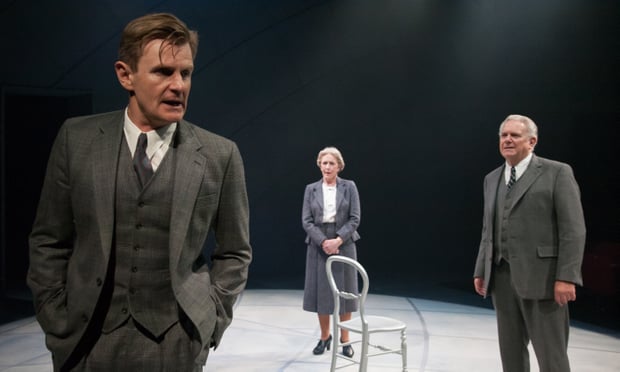Faith in science … Charles Edwards, Patricia Hodge and Paul Jesson in Copenhagen. Photograph: Conrad Blakemore
History, morality and quantum mechanics collide in Michael Blakemore’s storming revival of a modern classic
More information has come to light, since Michael Frayn’s play premiered in 1998, about its subject: the ruptured friendship between the German atomic physicist Werner Heisenberg, and his former mentor, Niels Bohr, after their meeting in Nazi-occupied Copenhagen in 1941. Yet the new material does nothing to alter the mind-expanding impact of a play that is about life’s cherishable value and insoluble mystery.
Frayn offers us several alternative versions of what might have happened when the two men met under the watchful eye of Bohr’s wife, Margrethe. But one of the beauties of the play is that, reinforcing a rule of quantum mechanics, it seems to change depending on how it is observed. At different times, it has seemed to me about the moral dilemma of the nuclear physicist, and the motives for Heisenberg’s visit – whether he was seeking absolution or information from his spiritual father.
While those ideas are still there, I was more struck this time by the Brechtian paradox at the heart of the play: that the vilified Heisenberg, by his failure to make the crucial calculation that would have enabled the Germans to develop the atomic bomb, never caused a single death; while the virtuous Bohr, by going on to work at Los Alamos, contributed to a hundred thousand.
Michael Blakemore’s illuminating production – designed, as in 1998, by Peter J Davison and lit by Mark Henderson – treats the stage as a space for the collision of human particles.
Charles Edwards is outstanding as Heisenberg in that he combines a Hamlet-like uncertainty about his own course of action with the physicist’s faith in intellectual disciplines: at one point he cries “mathematics is sense” with the fervour of an ardent rationalist. Patricia Hodge captures perfectly the wary scepticism of Margrethe, who sees the personal motives underlying scientific abstractions. However, while conveying Bohr’s paternal authority and impatience, Paul Jesson gave a rather blurred first-night performance and even rushed though vital speeches explaining Schrödinger’s wave function and uranium 235. Even if the science wasn’t as clear as it could be, it remains a remarkable play that has the rare capacity to make ideas manifest.
- At Chichester Festival theatre until 22 September.




